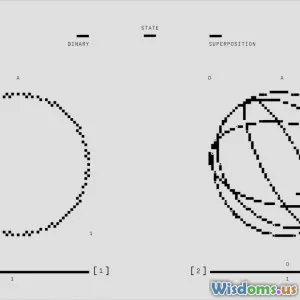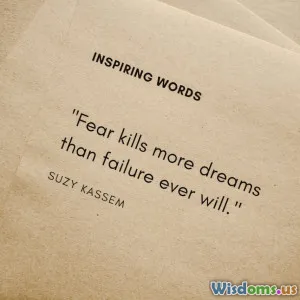
Is Universal Consciousness Real? A Quantum Approach
8 min read Exploring the reality of universal consciousness through the lens of quantum physics, blending spirituality with cutting-edge science. (0 Reviews)
Is Universal Consciousness Real? A Quantum Approach
Introduction: Unveiling the Mystery of Consciousness
Imagine a vast ocean—limitless, interconnected, and pulsing with life beyond any single drop within it. Could our individual consciousness be analogous to droplets on this ocean, each distinct yet inherently connected to a universal whole? The concept of universal consciousness has captivated philosophers and spiritual thinkers for centuries, proposing that all minds or beings share a single, underlying awareness. But is this just poetic metaphor or can science, especially quantum theory, bring us closer to the truth?
As we stand at the crossroads of spirituality and quantum physics, this article ventures into the intriguing question: Is universal consciousness real? By exploring key philosophical ideas, examining groundbreaking quantum phenomena, and considering modern interpretations, we aim to illuminate how universal consciousness transcends mysticism and enters the realm of scientific plausibility.
The Philosophical Foundation of Universal Consciousness
Fundamentally, universal consciousness suggests that consciousness is not limited to individual brains but is a fundamental property of the cosmos. Eastern traditions like Advaita Vedanta and Buddhism point towards an ultimate unity of all experience. The ancient philosopher Plotinus spoke of 'The One,' a foundational source of all existence and consciousness.
Philosopher David Chalmers champions the idea that consciousness may be a fundamental entity, not emergent from complex brain activity. This viewpoint challenges the dominant materialistic view, proposing panpsychism—the idea that consciousness is intrinsic even to basic particles.
Key Philosophical Questions
- Is consciousness confined to the brain, or is it universal?
- How do individual minds experience unity without losing subjective perspective?
Such queries set the stage for seeking scientific insights.
Quantum Physics: More Than Particles and Waves
Quantum mechanics, the branch of physics studying the smallest scales of matter and energy, reveals phenomena that defy classical logic: entanglement, superposition, and non-locality. Could these phenomena underpin universal consciousness?
Quantum Entanglement and Connectedness
Entanglement occurs when particles become linked such that the state of one instantly influences the state of another, regardless of distance. This challenges the classical idea that information cannot travel faster than light.
The famous Einstein-Podolsky-Rosen (EPR) paradox and Bell’s Theorem experiments confirm that entanglement is real. Some theorists speculate consciousness might operate similarly, with minds or awareness interconnected non-locally—the cornerstone of universal consciousness.
The Quantum Measurement Problem and Consciousness
The act of measurement in quantum mechanics collapses a wave of possibilities into one actuality. Eugene Wigner and other physicists proposed consciousness could play a role in this collapse, suggesting a link between observer awareness and physical reality.
While controversial, this interpretation raises profound questions about the role of consciousness as not just emergent but fundamental.
Modern Quantum Consciousness Theories
Several models attempt to unify quantum mechanics and consciousness:
Penrose-Hameroff ‘Orch OR’ Theory
Physicist Roger Penrose and anesthesiologist Stuart Hameroff suggest consciousness arises from quantum computations within microtubules inside brain neurons. Their theory implies that consciousness taps into quantum processes that resonate with universal fields.
Quantum Field and Consciousness
Some scientists argue consciousness stems from a pervasive quantum field—the Unified Field—pervading the universe, within which individual minds are localized expressions.
Implications for Universal Consciousness
If quantum states can maintain entanglement globally and consciousness emerges from quantum processes, it is conceivable that a universal mind or consciousness exists as an interconnected web beyond individual limitations.
Real-World Insights and Experiments
Global Consciousness Project
Since 1998, the Global Consciousness Project has monitored random number generators worldwide, hypothesizing that collective human attention affects physical systems. Results show anomalies correlated with major global events, suggesting a form of widespread consciousness interaction.
Meditation and Brainwave Synchronization
Neuroscientific studies reveal synchronized brainwaves in large populations during group meditation, hinting at a transient shared state of consciousness that echoes universal unity.
Challenges and Skepticism
The scientific community remains cautious, as many quantum consciousness claims lack definitive empirical proof. Critics argue quantum effects may not scale from particles to brain processes, emphasizing the need for rigorous methodologies.
Bridging Science and Spiritual Experience
Universal consciousness has traditionally been a subjective, spiritual experience—‘oneness,’ or ego dissolution reported in mystical states. Quantum approaches provide a potential framework validating these experiences scientifically.
Quote by physicist John Archibald Wheeler sums it up: “We are participators in bringing into being not only the near and here but the far away and long ago.”
By blending philosophical depth with quantum evidence, the dialogue between science and spirituality enriches our understanding of consciousness itself.
Conclusion: A Pathway to Deeper Awareness
Is universal consciousness real? While definitive proof remains elusive, the convergence of quantum physics and philosophy opens compelling avenues to reconsider consciousness beyond individual confines. Quantum entanglement, measurement problem theories, and emerging scientific projects challenge reductionist views and invite us to perceive consciousness as a unifying fabric of reality.
As our tools and insights expand, embracing this interdisciplinary inquiry not only deepens our grasp of the cosmos but also inspires us to nurture interconnectedness in everyday life. Whether you are a skeptic or a seeker, the quantum approach to universal consciousness ignites curiosity and hope for uncovering the fundamental nature of who we really are.
References & Further Reading:
- Penrose, R., & Hameroff, S. (2011). Consciousness in the universe: A review of the 'Orch OR' theory. Physics of Life Reviews.
- Chalmers, D.J. (1996). The Conscious Mind: In Search of a Fundamental Theory.
- Global Consciousness Project: https://noosphere.princeton.edu
- Bell, J.S. (1964). On the Einstein-Podolsky-Rosen paradox. Physics Physique Физика.
- Wigner, E.P. (1961). Remarks on the mind-body question. Symmetries and reflections.
Explore this nexus between spirituality and quantum mechanics to challenge your perception of consciousness and reality.
Rate the Post
User Reviews
Other posts in Philosophy of Mind
Popular Posts














